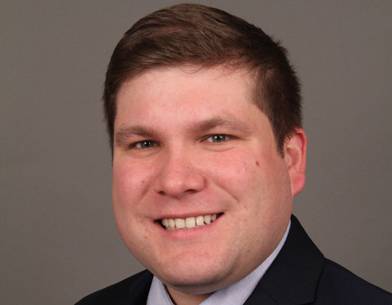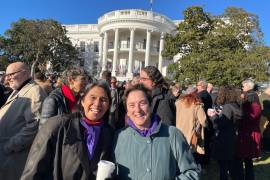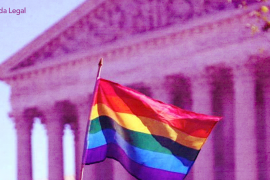
No Same-Sex Couple Left Behind: SCOTUS Ruling for the Freedom to Marry Would Apply with Equal Force to U.S. Territories
Blog Search
A month ago, Outward writer Mark Joseph Stern wondered what would happen to “those 4 million Americans who don’t live in [the] states, but in one of five U.S. territories?” In so doing, Stern aptly noted that the applicability of rights guaranteed by the U.S. Constitution to the people of Puerto Rico, the U.S. Virgin Islands, Guam, the Northern Mariana Islands, and American Samoa is not completely straightforward. And frankly, the answer is not the same with regards to all of them. But we must rest assured that the fundamental rights guaranteed by the Constitution as well as the equal protection of the laws are directly applicable to most, it not all, of the five U.S. territories. The right to marry is as much protected by the U.S. Constitution for lesbian, gay, bisexual, and transgender people in Puerto Rico, the U.S. Virgin Islands, Guam, and the Northern Mariana Islands as it is for LGBT people in Indiana, Oregon, Pennsylvania, Virginia, and Utah.
Let’s start with some background information. The people of the five U.S. territories live in a judicially created political status of “unincorporated” territories. As such, the U.S. Supreme Court and federal courts have declined to wade into the politically charged waters of what the ultimate resolution of the political status of these territories ought to be. But while the Supreme Court might have decided in the Insular Cases early in the twentieth century that the full panoply of constitutional rights do not apply to the people of the “unincorporated” territories, there should be no doubt today that the citizens of Puerto Rico, the U.S. Virgin Islands, Guam, and the Northern Mariana Islands enjoy the same right to equal protection and fundamental rights, including the right to marry, as citizens of the states and the District of Columbia. That is because the people of the U.S. territories, except for American Samoa, are U.S. citizens by birth and have been extended those very same rights by the Supreme Court or by acts of Congress, specifically, each of the territories’ organic acts.
As a result, both the U.S. Supreme Court and the Court of Appeals for the First Circuit have already explicitly stated that the rights to equal protection and the fundamental rights protected by the due process guarantee of the Constitution are directly applicable to the people of Puerto Rico. Indeed, as far back as 1976, the Supreme Court made clear “that the protections accorded by either the Due Process Clause of the Fifth Amendment or the Due Process and Equal Protection Clauses of the Fourteenth Amendment apply to residents of Puerto Rico.” That is partly why Lambda Legal is currently representing four loving and valiant same-sex couples from Puerto Rico before the First Circuit in Conde-Vidal v. Rius-Armendariz. That’s also why the Commonwealth of Puerto Rico officially announced on March 20, 2015 that it was abandoning its defense to Puerto Rico’s Marriage Ban. So let there be no doubt, should the Supreme Court decide that bans on the right to marry of same-sex couples violate the well-established fundamental right to marry or the equal protection guarantee of the U.S. Constitution, that the estimated 6,600 same-sex couples in Puerto Rico will not be left behind.
By the same token, the same-sex couples in the U.S. Virgin Islands, Guam, and Northern Mariana Islands will not be left behind. The constitutional guarantees of equal protection and the fundamental rights guaranteed by due process also apply to the people of those territories. Appeals from the U.S. territorial court from the Virgin Islands go to the U.S Court of Appeals for the Third Circuit, while those from Guam and the Northern Mariana Islands go to the U.S. Court of Appeals for the Ninth Circuit. The Third Circuit has already recognized that the U.S. Virgin Islands’ Organic Act (48 USCS § 1561) extends to the people of the Virgin Islands the equal protection and due process guarantees of the Fourteenth Amendment. Likewise, the Ninth Circuit has made clear that the 1968 Mink Amendment to Guam’s Organic Act “expressly extends to Guam” the constitutional rights guaranteed by the Fourteenth Amendment. It also has held that the Fourteenth Amendment applies to the Northern Mariana Islands "as if the Northern Mariana Islands were one of the several states.” As such, any ruling in favor of the freedom to marry by the Supreme Court would be directly applicable to these three territories. What is more, same-sex couples wishing to marry in the Guam or the Northern Mariana Islands should be able to marry now. Under binding precedent established by the Ninth Circuit when it decided Latta v.Otter, a case from Idaho, along with Lambda Legal’s case in Nevada (Sevcik v. Sandoval), same-sex couples in Guam and the Northern Mariana Islands cannot be denied the right to marry on account of the two members of the couple being of the same sex.
Recently, a lesbian couple in Guam filed suit after being denied a marriage license, despite the Ninth Circuit’s binding precedent. In response, Guam’s Attorney General issued an opinion stating that Guam must issue marriage licenses to same-sex couples because “the Ninth Circuit’s recent decision has rendered Guam’s marriage statute legally unenforceable.” Still, Guam’s governor has unfortunately chosen to ignore both the Attorney General’s opinion and the binding legal authority on which it is based, continuing Guam’s marriage discrimination on the completely false premise that the Ninth Circuit has allowed continued enforcement of the marriage bans in a couple of states. But same-sex couples have been able to marry in every state in the Ninth Circuit where marriage bans have been challenged for months, and the Supreme Court of the United States has denied every petition to delay those decisions going into effect. There simply is no reason why same-sex couples in Guam, or the Northern Mariana Islands, cannot marry now.
This leaves us with the unique situation of American Samoa (the population of which numbers 55,000). It is important to understand that the people of American Samoa are not U.S. citizens, but rather U.S. nationals. Unlike the other U.S. territories, Congress has not enacted an organic act for American Samoa. As such, the U.S. Court of Appeals for the D.C. Circuit has determined that the constitutional rights not expressly extended to American Samoa may not apply. As such, the question remains open. Currently pending before the D.C. Circuit is a lawsuit arguing that the people of American Samoa should be considered U.S. citizens under the Fourteenth Amendment’s Citizenship Clause. The outcome of that case may influence the applicability of any SCOTUS ruling in favor of the freedom to marry.
LGBT people in the U.S. territories are entitled to the same equal rights and dignity than the people in the states and D.C. Their quest to enjoy the well-established fundamental right to marry and to be treated with equality and dignity is of no less value than the quests successfully forged (so far) by scores of same-sex couples across our country. So the applicability of a SCOTUS ruling with regards to American Samoa remains an open question, for the 3.6 million people in Puerto Rico, and the more than 100,000 people in the U.S. Virgin Islands, 160,000 people in Guam, and 54,000 people in the Northern Mariana Islands, the question posed is not one we need to look far for an answer. The equal protection and due process guarantees of the U.S. Constitution apply with equal force in their territories. A SCOTUS ruling in favor of the freedom to marry will not leave the same-sex couples in those territories behind.




